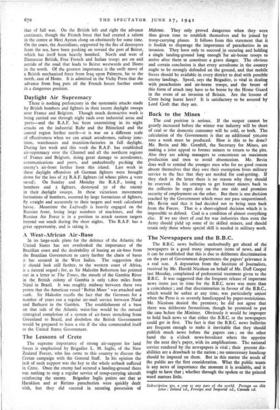The Lessons of Crete
The supreme importance of strong air-support for land forces is emphasised by Brigadier L. M. Inglis, of the New Zealand Forces, who has come to this country to discuss the Cretan campaign with the General Staff. In his opinion the lack of such support was the key to the whole setback suffered in Crete. Once the enemy had secured a landing-ground there was nothing to stop a regular service of troop-carrying aircraft reinforcing the enemy. Brigadier Inglis points out that at Haraklion and at Retimo parachutists were quickly dealt with, but they did succeed in securing possession of Maleme. They only proved dangerous when they • were thus given time to establish themselves and be joined by troop-carrying planes. It follows from this statement that it is foolish to disparage the importance of parachutists in an invasion. They have only to succeed in securing and holding a single landing-ground long enough for air-borne troops to arrive after them to constitute a grave danger. The obvious and certain conclusion is that every aerodrome in the country ought to be strongly defended on the ground, and that mobile forces should be available in every district to deal with possible enemy landings. Speed, says the Brigadier, is vital in dealing with parachutists and air-borne troops, and the brunt of this form of attack may have to be borne by the Home Guard in the event of an invasion of Britain. Are the lessons of Crete being learnt here? It is satisfactory to be assured by Lord Croft that they are.






















 Previous page
Previous page